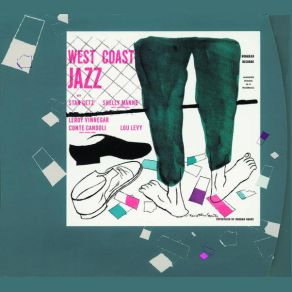West Coast Jazz
Download links and information about West Coast Jazz by Stan Getz. This album was released in 1955 and it belongs to Jazz, World Music genres. It contains 13 tracks with total duration of 01:13:52 minutes.

|
|
|---|---|
| Artist: | Stan Getz |
| Release date: | 1955 |
| Genre: | Jazz, World Music |
| Tracks: | 13 |
| Duration: | 01:13:52 |
| Buy it NOW at: | |
| Buy on iTunes $4.99 | |
| Buy on Amazon $4.99 | |
| Buy on Amazon $27.67 | |
| Buy on iTunes $9.99 | |
Tracks
[Edit]| No. | Title | Length |
|---|---|---|
| 1. | East of the Sun (And West of the Moon) | 6:21 |
| 2. | Four | 7:36 |
| 3. | Suddenly It's Spring | 7:00 |
| 4. | Night in Tunisia | 6:12 |
| 5. | Summertime | 6:08 |
| 6. | S-H-I-N-E | 9:05 |
| 7. | Split Kick | 7:56 |
| 8. | Of Thee I Sing | 4:13 |
| 9. | A Handful of Stars | 3:23 |
| 10. | Love Is Here to Stay | 3:28 |
| 11. | Serenade in Blue | 4:04 |
| 12. | Of Thee I Sing (Alternate Take) [Alternate Take] | 4:57 |
| 13. | Love Is Here to Stay (Alternate Take) [Alternate Take] | 3:29 |
Details
[Edit]Between his celebrated late-1940s tenure in Woody Herman’s big band and his beloved bossa nova recordings of the early 1960s, tenor Stan Getz produced some of his most robust and lasting albums, mostly in a straight bop vein. Recorded in Hollywood in August of 1955, West Coast Jazz utilized the talents of L.A.’s finest: trumpeter Conte Candoli, pianist Lou Levy, bassist Leroy Vinnegar, and drummer Shelly Manne. At a time when “West Coast jazz” was being dismissed back in New York as too cool and cerebral, the title was meant to be a joke; all of the players here were East Coast transplants, and by this point, Getz’s dry, feathery, Lester Young-inspired style had been injected with a dose of Charlie Parker’s combustibility. Still, it’s hard to deny the certain subtle distinctions in his elegant tone, in the band’s relaxed, fluid interplay, and in the smoothed edges of the rhythm section, especially on leisurely standards like “East of the Sun” and “Summertime.” Three bop chestnuts of then-recent vintage — Dizzy Gillespie’s “A Night in Tunisia,” Miles Davis’s “Four,” and Horace Silver’s “Split Kick” — raise the temperature, but most memorable is “S-H-I-N-E,” an obscure 1920s pop tune that is taken at a blistering pace and includes some of Getz’s most agile and sizzling work.